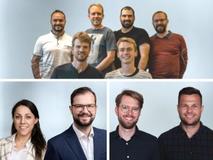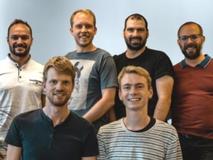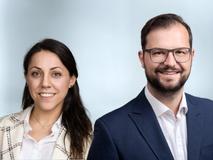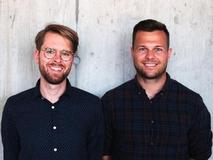CHF 40,000 each for Augmented Reality glasses for remote industrial monitoring, sustainable chemicals, and data predictive control for building automation companies
19.11.2021
Almer Technologies, Biosimo, and viboo win Venture Kick's second stage of financial and entrepreneurial support. Their projects provide a good balance with AR glasses that can be worn all day long; an innovative heterogeneous catalyst that enables the oxidation of ethanol inflow without the formation of CO2; and provide data predictive control as a cloud service to building automation companies.
 |
 Almer Technologies: in the back from left to right: Daniel Puerta (Head Supply Chain & Manufacturing), David Lorenz (Electrical Engineer from the research partner ZHAW), Stefan Kunz (Electrical Engineer from the research partner ZHAW), Stefan Pauli (Research projects and use case development), in the front from left to right: Timon Binder (CTO), Sebastian Beetschen (CEO)
|
 Biosimo Founder Sotiria Mostrou and Co-founder Maximilian Moser
|
 viboo: CEO Felix Buenning, CTO Benjamin Huber
|
Almer Technologies: Augmented Reality glasses for remote industrial monitoring
Augmented reality (AR) glasses enable simultaneous perception of reality and additional virtual information. However, today's AR glasses have either few application possibilities that differentiate them from a smartwatch (e.g., Google Glass, North Focals) or they can only be worn for short periods of time because, among other things, they are heavy (>500g) and have a short battery life (< 3h) (e.g. Microsoft Hololens). The Hololens and Magic Leap are able to do nearly everything but are clunky, heavy, and with low battery life and can therefore only be worn for a short time. On the other hand, there are glasses on the market like the Google Glass and North Focals which can be worn all day long but can only do about as much as a smartwatch. Today's AR glasses have all been drawn to these two extremes.
To tackle these issues, Almer Technologies was created by a team of experts composed of CEO Sebastian Beetschen, experience in AR-computer vision working at Microsoft Hololens, Head of Optics Lars Hermann, Ph.D. ETH Zurich, UK Cambridge, Research projects and use case development Stefan Pauli, Ph.D. ETH Zurich, CTO Timon Binder, EPFL Robotics, Head Supply Chain & Manufacturing Daniel Puerta Diaz and Advisors: Christian Brand, Jeremias Jurt, Georg Conrad. In order to increase worker productivity by 10% (e.g. for documentation and processing of checklists), AR glasses are being developed, which allow hands-free operation, long-wearing times personal eyeglass correction, and foldable temples. Almer, however, has found a way to provide a good balance with AR glasses that can be worn all day long and still are capable of supporting a wide range of applications. To do so, they focussed in the last 1.5 years on making the optical system much more efficient, in terms of lightweight, power consumption, and manufacturing. Further, they are developing the first foldable conductive temples of self-contained AR glasses and are integrating everything into a miniaturized system. The estimated market size of AR is at USD 1.64 Billion in 2018 with an annual growth of 73.8%, leading to a market potential of USD 26 Billion in 2023.
The Venture Kick funds will be used to cover the material costs for the 30 fully integrated working prototypes in mid-November 2021.
viboo: providing data predictive control to building automation companies
Buildings are responsible for roughly a third of the worlds’ energy consumption and CO2 emissions. While refurbishment of buildings is associated with high initial investments, building operation can be improved at extremely low costs by upgrading its control systems. Even though, there is a trend towards digitalized products the underlying control technology has not changed too much and the available data is not fully exploited yet.
viboo's co-founders are CEO Felix Bünning, an expert in building energy control, and CTO Benjamin Huber, who has expertise in building energy control and project management. Further, they are currently looking for additional competences in the area of software engineering, financials, and business development. Their technology allows operating buildings more efficiently. It is based on a combination of physics-informed Machine Learning and MPC. With minimal commissioning effort, the heating and cooling energy consumption of a building can be reduced by 26-49% while thermal comfort is improved. Due to its flexibility, the technology also allows easy integration of future topics such as offering demand-flexibility or time-varying energy prices. viboo brings the technology to buildings in a scalable and cost-efficient way through a cloud software service. Building automation companies interface the cloud software to make their digitalized products smart and bring innovative building control to their customer's buildings immediately. Proof of concept, supported by SNF BRIDGE, is provided in different pilot projects in collaboration with the market leaders (e.g. Danfoss). Worldwide, the TAM is estimated at 30.15 Billion USD in 2020 with an annual growth rate of 15.05%
The Venture Kick funds from the second stage will be used to develop the product for market entry, extended market research, team creation, and incorporation.
Augmented reality (AR) glasses enable simultaneous perception of reality and additional virtual information. However, today's AR glasses have either few application possibilities that differentiate them from a smartwatch (e.g., Google Glass, North Focals) or they can only be worn for short periods of time because, among other things, they are heavy (>500g) and have a short battery life (< 3h) (e.g. Microsoft Hololens). The Hololens and Magic Leap are able to do nearly everything but are clunky, heavy, and with low battery life and can therefore only be worn for a short time. On the other hand, there are glasses on the market like the Google Glass and North Focals which can be worn all day long but can only do about as much as a smartwatch. Today's AR glasses have all been drawn to these two extremes.
To tackle these issues, Almer Technologies was created by a team of experts composed of CEO Sebastian Beetschen, experience in AR-computer vision working at Microsoft Hololens, Head of Optics Lars Hermann, Ph.D. ETH Zurich, UK Cambridge, Research projects and use case development Stefan Pauli, Ph.D. ETH Zurich, CTO Timon Binder, EPFL Robotics, Head Supply Chain & Manufacturing Daniel Puerta Diaz and Advisors: Christian Brand, Jeremias Jurt, Georg Conrad. In order to increase worker productivity by 10% (e.g. for documentation and processing of checklists), AR glasses are being developed, which allow hands-free operation, long-wearing times personal eyeglass correction, and foldable temples. Almer, however, has found a way to provide a good balance with AR glasses that can be worn all day long and still are capable of supporting a wide range of applications. To do so, they focussed in the last 1.5 years on making the optical system much more efficient, in terms of lightweight, power consumption, and manufacturing. Further, they are developing the first foldable conductive temples of self-contained AR glasses and are integrating everything into a miniaturized system. The estimated market size of AR is at USD 1.64 Billion in 2018 with an annual growth of 73.8%, leading to a market potential of USD 26 Billion in 2023.
The Venture Kick funds will be used to cover the material costs for the 30 fully integrated working prototypes in mid-November 2021.
Biosimo: Sustainable chemicals for a greener future
Biosimo is an engineering start-up focusing on the development and industrialization of new routes to manufacture bio-sourced commodity chemicals, which are the base of all synthetic products, such as plastics, cosmetics, and pharmaceuticals. Most derive from fossils, using energy-intensive and toxic processes.
Biosimo's team combines essential technical expertise with business acumen. Dr. Sotiria Mostrou, CEO and Founder, created her first company at 19 years old and is the principal investigator of Biosimo's technology. Dr. Maximilian Moser, CTO and Founder, is an expert in commercializing catalytic technologies and chemical-go-to-market. They are supported by a group of advisors on R&D development, market and customer needs, and entrepreneurship and are currently expanding their team. Their first technology replaces the current production route of acetic acid from coal, with a novel process using bio-ethanol. They designed an innovative heterogeneous catalyst that enables the oxidation of ethanol inflow without the formation of CO2. They are currently scaling up their technology with the help of SNF bridge, Venture Kick and ETH Zurich, to launch the first pilot plant by 2023. First product samples are being tested with interested customers to validate their product for use in the chemical value chain. The global market for acetic acid is estimated at 13bn CHF, growing at a 6.2% p.a. Acetic acid is one of the most financially promising bio-based platform chemicals with one of the highest selling prices. Key products for acetic acid are vinyl acetate, cellulose acetate, acetate esters, terephthalic acid, food additives, which find widespread application in their consumer goods.
The Venture Kick Phase 2 will accelerate their efforts in designing the pilot plant, complete the Freedom-to-operate, Life Cycle Analysis, and economic studies, and increase sample production for interested customers. biosimo-chemicals.com
viboo: providing data predictive control to building automation companies
Buildings are responsible for roughly a third of the worlds’ energy consumption and CO2 emissions. While refurbishment of buildings is associated with high initial investments, building operation can be improved at extremely low costs by upgrading its control systems. Even though, there is a trend towards digitalized products the underlying control technology has not changed too much and the available data is not fully exploited yet.
viboo's co-founders are CEO Felix Bünning, an expert in building energy control, and CTO Benjamin Huber, who has expertise in building energy control and project management. Further, they are currently looking for additional competences in the area of software engineering, financials, and business development. Their technology allows operating buildings more efficiently. It is based on a combination of physics-informed Machine Learning and MPC. With minimal commissioning effort, the heating and cooling energy consumption of a building can be reduced by 26-49% while thermal comfort is improved. Due to its flexibility, the technology also allows easy integration of future topics such as offering demand-flexibility or time-varying energy prices. viboo brings the technology to buildings in a scalable and cost-efficient way through a cloud software service. Building automation companies interface the cloud software to make their digitalized products smart and bring innovative building control to their customer's buildings immediately. Proof of concept, supported by SNF BRIDGE, is provided in different pilot projects in collaboration with the market leaders (e.g. Danfoss). Worldwide, the TAM is estimated at 30.15 Billion USD in 2020 with an annual growth rate of 15.05%
The Venture Kick funds from the second stage will be used to develop the product for market entry, extended market research, team creation, and incorporation.


